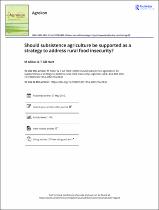| dc.contributor.author | Aliber, M | |
| dc.contributor.author | Hart, T. G. B. | |
| dc.date.accessioned | 2023-05-22T13:35:36Z | |
| dc.date.available | 2023-05-22T13:35:36Z | |
| dc.date.issued | 2009 | |
| dc.identifier.citation | Aliber, M., & Hart, T. G. B. (2009). Should subsistence agriculture be supported as a strategy to address rural food insecurity?. Agrekon, 48(4), 434-458. https://doi.org/10.1080/03031853.2009.9523835 | en_US |
| dc.identifier.issn | 2078-0400 | |
| dc.identifier.uri | https://doi.org/10.1080/03031853.2009.9523835 | |
| dc.identifier.uri | http://hdl.handle.net/10566/8929 | |
| dc.description.abstract | At first glance South Africa’s black farming sector appears to contribute rather
minimally to overall agricultural output in South Africa. However, despite the
complexity involved in this sector and the often marginal conditions in which
agriculture is practised it appears to be important to a large number of black
households. Furthermore, the significance they attach to subsistence agriculture as
means of supplementing household food supplies seems to heavily outweigh other
reasons for engaging in agriculture. Some South African researchers have indicated
the contribution subsistence production makes to household food security, despite the
prevalent complexities and the low input nature of this production. Statistics South
Africa’s Labour Force Survey data from 2001 to 2007 and a case study of subsistence
farming in Limpopo Province are used to support the argument that, despite the
complexity of this sector, the more than 4 million subsistence farmers, need and merit
greater support. | en_US |
| dc.language.iso | en | en_US |
| dc.publisher | Taylor and Francis Group | en_US |
| dc.subject | Agriculture | en_US |
| dc.subject | Traditional crops | en_US |
| dc.subject | Labour | en_US |
| dc.subject | South Africa | en_US |
| dc.subject | Farming sector | en_US |
| dc.title | Should subsistence agriculture be supported as a strategy to address rural food insecurity? | en_US |
| dc.type | Article | en_US |

